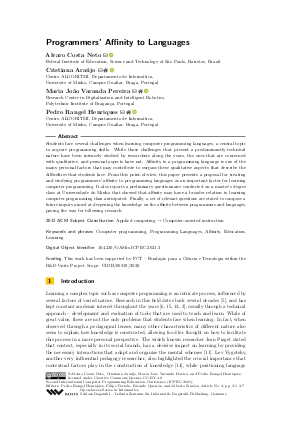Programmers' Affinity to Languages
Authors
Alvaro Costa Neto  ,
Cristiana Araújo
,
Cristiana Araújo  ,
Maria João Varanda Pereira
,
Maria João Varanda Pereira  ,
Pedro Rangel Henriques
,
Pedro Rangel Henriques 
-
Part of:
Volume:
Second International Computer Programming Education Conference (ICPEC 2021)
Part of: Series: Open Access Series in Informatics (OASIcs)
Part of: Conference: International Computer Programming Education Conference (ICPEC) - License:
 Creative Commons Attribution 4.0 International license
Creative Commons Attribution 4.0 International license
- Publication Date: 2021-07-01
File

PDF
OASIcs.ICPEC.2021.3.pdf
- Filesize: 421 kB
- 7 pages
Document Identifiers
Subject Classification
ACM Subject Classification
- Applied computing → Computer-assisted instruction
Keywords
- Computer programming
- Programming Languages
- Affinity
- Education
- Learning
Metrics
- Access Statistics
-
Total Accesses (updated on a weekly basis)
0Document
0Metadata
Abstract
Students face several challenges when learning computer programming languages, a central topic to acquire programming skills. While those challenges that present a predominantly technical nature have been intensely studied by researchers along the years, the ones that are concerned with qualitative, and personal aspects have not. Affinity to a programming language is one of the many personal factors that may contribute to surpass these qualitative aspects that describe the difficulties that students face. From this point-of-view, this paper presents a proposal for treating and studying programmers' affinity to programming languages as an important factor for learning computer programming. It also reports a preliminary questionnaire conducted on a master’s degree class at Universidade do Minho that showed that affinity may have a broader relation to learning computer programming than anticipated. Finally, a set of relevant questions are stated to compose a future inquiry aimed at deepening the knowledge on the affinity between programmers and languages, paving the way for following research.
Cite As Get BibTex
Alvaro Costa Neto, Cristiana Araújo, Maria João Varanda Pereira, and Pedro Rangel Henriques. Programmers' Affinity to Languages. In Second International Computer Programming Education Conference (ICPEC 2021). Open Access Series in Informatics (OASIcs), Volume 91, pp. 3:1-3:7, Schloss Dagstuhl – Leibniz-Zentrum für Informatik (2021)
https://doi.org/10.4230/OASIcs.ICPEC.2021.3
BibTex
@InProceedings{costaneto_et_al:OASIcs.ICPEC.2021.3,
author = {Costa Neto, Alvaro and Ara\'{u}jo, Cristiana and Pereira, Maria Jo\~{a}o Varanda and Henriques, Pedro Rangel},
title = {{Programmers' Affinity to Languages}},
booktitle = {Second International Computer Programming Education Conference (ICPEC 2021)},
pages = {3:1--3:7},
series = {Open Access Series in Informatics (OASIcs)},
ISBN = {978-3-95977-194-8},
ISSN = {2190-6807},
year = {2021},
volume = {91},
editor = {Henriques, Pedro Rangel and Portela, Filipe and Queir\'{o}s, Ricardo and Sim\~{o}es, Alberto},
publisher = {Schloss Dagstuhl -- Leibniz-Zentrum f{\"u}r Informatik},
address = {Dagstuhl, Germany},
URL = {https://drops.dagstuhl.de/entities/document/10.4230/OASIcs.ICPEC.2021.3},
URN = {urn:nbn:de:0030-drops-142192},
doi = {10.4230/OASIcs.ICPEC.2021.3},
annote = {Keywords: Computer programming, Programming Languages, Affinity, Education, Learning}
}
Author Details
- Federal Institute of Education, Science and Technology of São Paulo, Barretos, Brazil
- Centro ALGORITMI, Departamento de Informática, University of Minho, Campus Gualtar, Braga, Portugal
- Research Centre in Digitalization and Intelligent Robotics, Polytechnic Institute of Bragança, Portugal
Funding
This work has been supported by FCT – Fundação para a Ciência e Tecnologia within the R&D Units Project Scope: UIDB/00319/2020.
References
- M. V. P. Almeida, L. M. Alves, M. J. V. Pereira, and G. A. R. Barbosa. EasyCoding - Methodology to Support Programming Learning. In Ricardo Queirós, Filipe Portela, Mário Pinto, and Alberto Simões, editors, First International Computer Programming Education Conference (ICPEC 2020), volume 81 of OpenAccess Series in Informatics (OASIcs), pages 1:1-1:8, Dagstuhl, Germany, 2020. Schloss Dagstuhl-Leibniz-Zentrum für Informatik. URL: https://doi.org/10.4230/OASIcs.ICPEC.2020.1.
-
M.V.P. Almeida. Easycoding: Methodology to support programming learning. Master’s thesis, Instituto Politécnico de Bragança, 2020.

- A.G. Applin. Second language acquisition and cs1. SIGCSE Bull., 33(1):174–178, February 2001. URL: https://doi.org/10.1145/366413.364579.
-
D.R. Barbosa. CnE-Ar: Teaching of Computational Thinking to Adults in Reconversion. Master’s thesis, Minho University, Braga, Portugal, April 2021. MSc dissertation (to be discussed and published).

- R.R. Fenichel, J. Weizenbaum, and J.C. Yochelson. A program to teach programming. Communications of the ACM, 13(3):141–146, March 1970. URL: https://doi.org/10.1145/362052.362053.
- J. Figueiredo and F.J. García-Peñalvo. Building skills in introductory programming. In Proceedings of the Sixth International Conference on Technological Ecosystems for Enhancing Multiculturality, TEEM'18, page 46–50, New York, NY, USA, 2018. Association for Computing Machinery. URL: https://doi.org/10.1145/3284179.3284190.
-
P. Freire. Pedagogia da Autonomia: Saberes necessários à prática educativa. Paz e Terra, 2011.

-
A. Gomes and A.J. Mendes. Learning to program: difficulties and solutions. In Proceedings of the 2007 ICEE International Conference on Engineering and Education, ICEE '07. International Network on Engineering Education and Research, 2007.

-
P.J. Guo. Non-native english speakers learning computer programming: Barriers, desires, and design opportunities. In Proceedings of the 2018 CHI Conference on Human Factors in Computing Systems, CHI '18, page 1–14, New York, NY, USA, 2018. Association for Computing Machinery.

-
P.R. Henriques. Brincando às Linguagens com Rigor: Engenharia gramatical. PhD thesis, Universidade do Minho, 2013.

-
J. Piaget, M. Piercy, and D.E. Berlyne. The Psychology of Intelligence. Routledge classics. Routledge, 2001.

- S.A. Robertson and M.P. Lee. The application of second natural language acquisition pedagogy to the teaching of programming languages—a research agenda. SIGCSE Bulletin, 27(4):9–12, December 1995. URL: https://doi.org/10.1145/216511.216517.
- StatisticsTimes.com. Top computer languages, 2020. URL: http://statisticstimes.com/tech/top-computer-languages.php.
-
L.S. Vygotsky, E. Hanfmann, G. Vakar, and A. Kozulin. Thought and Language. The MIT Press. MIT Press, 2012.

- B.C. Wilson and S. Shrock. Contributing to success in an introductory computer science course: A study of twelve factors. In Proceedings of the Thirty-Second SIGCSE Technical Symposium on Computer Science Education, SIGCSE '01, page 184–188, New York, NY, USA, 2001. Association for Computing Machinery. URL: https://doi.org/10.1145/364447.364581.
